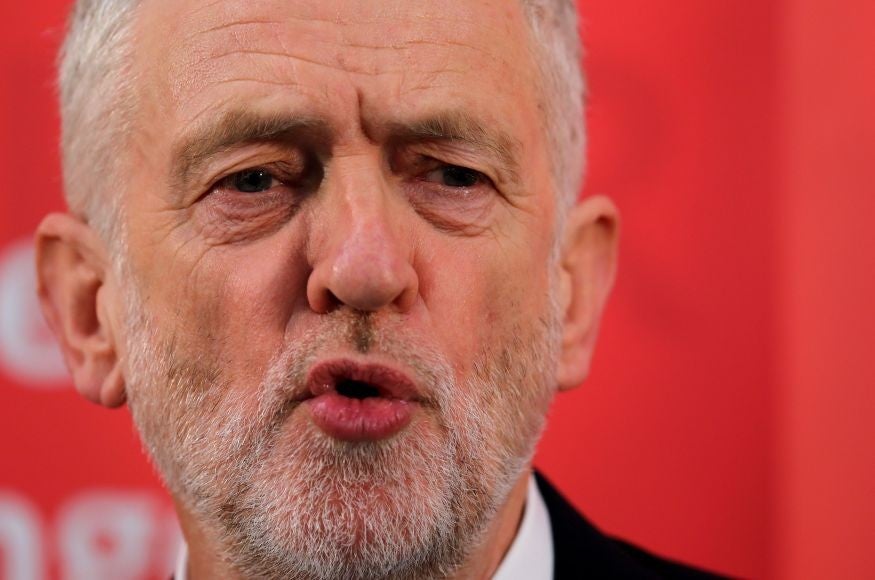Jeremy Corbyn clashes with Labour defence spokeswoman Nia Griffith over support for Nato action
The Shadow Defence Secretary says backing for Nato is a ‘red line’ – after the Labour leader suggests sending troops to Estonia is increasing tensions with Russia

Your support helps us to tell the story
From reproductive rights to climate change to Big Tech, The Independent is on the ground when the story is developing. Whether it's investigating the financials of Elon Musk's pro-Trump PAC or producing our latest documentary, 'The A Word', which shines a light on the American women fighting for reproductive rights, we know how important it is to parse out the facts from the messaging.
At such a critical moment in US history, we need reporters on the ground. Your donation allows us to keep sending journalists to speak to both sides of the story.
The Independent is trusted by Americans across the entire political spectrum. And unlike many other quality news outlets, we choose not to lock Americans out of our reporting and analysis with paywalls. We believe quality journalism should be available to everyone, paid for by those who can afford it.
Your support makes all the difference.Jeremy Corbyn has clashed with his own defence spokeswoman after he again cast doubt on his support for Nato.
Nia Griffith made clear she was “absolutely furious” after the Labour leader’s spokesman questioned Britain sending 800 troops to Estonia as part of a Nato taskforce to deter Russia.
The spokesman said: “Jeremy has expressed concerns about that being one of the escalations of tensions that have taken place.”
But a source close to Ms Griffith told the BBC that support for Nato was a “red line” for her, although she was not considering her position.
The Shadow Defence Secretary has visited the troops in Estonia and had earlier expressed her staunch support in an interview with Forces TV.
She told the station: “I think it’s very, very, important that we now play a very strong role in Nato, particularly as we are leaving the European Union.
“I think it’s very important for Nato to be absolutely clear, following what has happened in Ukraine, that we are standing together as Nato nations and there is no way that we would tolerate any attack on any one of our member states.”
But, a few hours later, in a briefing for journalists, Mr Corbyn’s spokesman suggested both Russia and Nato had to share the blame for worsening relations.
And he again cast doubt on whether Mr Corbyn believes Nato members are committed to offer military support if a fellow member is attacked.
The spokesman said: “What we don’t want to see is a ratcheting up of tensions between Russia and the West, as has been taking place.
“We’ve said repeatedly that we want talks and engagement to wind down military tensions, particularly on the Nato-Russian border and in the Middle East.”
Asked what would happen if, for example, Russia invaded Estonia, the spokesman said the appropriate response could fall short of military action.
He said: “Article 5 [of the Nato treaty] means that if there is an attack on another Nato state there has to be a response by Nato members – it doesn’t define what that response should be.
“In practice, if you see from the wording of the treaty, that can be a whole range of things. But what we’re looking for is a reduction of tension and a negotiated engagement.”
Asked about the comments, a source close to Ms Griffith said she was “absolutely furious” and “absolutely livid”.
Labour backbencher Mike Gapes, tweeted: “Labour Attlee established Nato. Under Blair enlarged to Baltic States. Article 5 collective defence absolutely essential for all members.”
In June 2015, RAF Typhoons, which have been deployed to the Baltic region each year since May 2014, were scrambled from Estonia to intercept and shadow two Russian military aircraft over the Baltic Sea.
The Ministry of Defence announced last July that 500 UK troops would be permanently based in Estonia, that number being increased to about 800 in October. They will be deployed soon.
Defence Secretary Sir Michael Fallon said the military build-up was intended to “deter Russia from any further aggression”.
Join our commenting forum
Join thought-provoking conversations, follow other Independent readers and see their replies
Comments